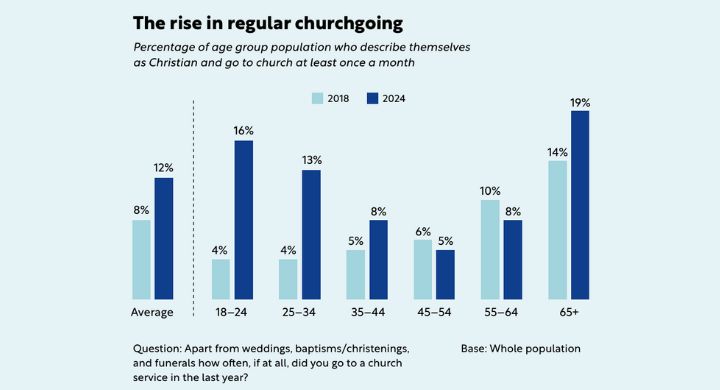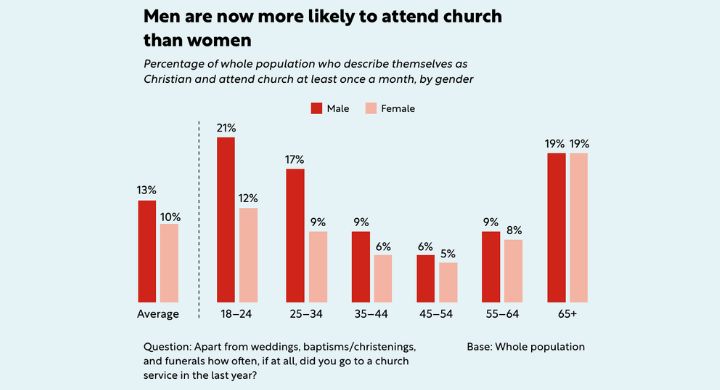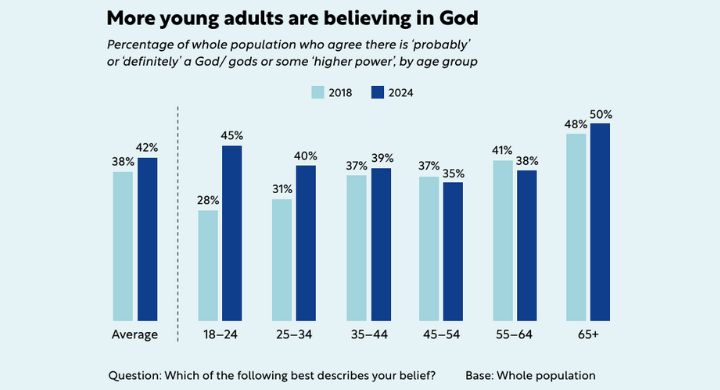Holly Baines explores the recent spike in church attendance and analyses what is prompting her generation, Gen Z, to flood back to the church.
Although the UK has a strong Christian heritage, in recent years it has increasingly become known as a secular nation.
Church attendance declined drastically, and in January this year, it was reported that more than 3,500 churches across the UK had closed in the last decade, with some even being converted into mosques.
Our nation abandoned many of her foundational biblical morals and teachings.
This resulted in the breakdown of family, and the loss of a cohesive, morally upright society according to what God set out in his word.
In 2021, for the first time England and Wales no longer had a Christian majority, with only 46.2% of the population identifying as Christian. On the face of it, this is all very disturbing news.
And with the rise of Gen Z, one would think that secularism would only increase.
After all, our generation is independent, pragmatic, and prioritises evidence over simply ‘doing what’s always been done’.
Some have called us the generation of ‘nones’ due to the widespread non-affiliation with any particular religious movement, the willingness to ‘try everything’, and the increasing shift towards agnosticism and atheism.
However, a new report, titled “The Quiet Revival”, has sent ripples ruffling the calm surface of entrenched secularism in the UK.
Church attendance up 50% in 6 years
“The Quiet Revival Report” reveals that the decline of church attendance in England and Wales has not only stopped, but is being turned around by Gen Z.
Although Gen Z is often portrayed as being increasingly liberal, anti-organised religion, and highly sceptical of Christianity, a segment of young people may be changing this narrative.
‘The Quiet Revival’ states that over the last 6 years, those identifying as Christians who say they attend church at least once a month has risen by 50%.
This represents a growth from 8% of the population (3.7 million) to 12% of the population (5.8 million).

And this increase is driven by Gen Z: “Where once we saw aging congregations and a steady decline in attendance, we see dramatic growth, led by the young. Where once we saw apathy or even hostility to Christianity and the Bible we see increased openness, again among the young.”
In 2018, 4 percent of 18 to 24-year-olds said that they attended church at least monthly.
This has now quadrupled to 16%, with young women increasing from 3 to 12 percent and young men increasing from 4 to 21 per cent.
This is a remarkable turnaround and one which I imagine few people saw coming.
What has prompted this change?
Is it a desperate but fleeting search for meaning, or could it be rooted in a deeper cultural shift?
Where is the growth happening?
Previous generations have increasingly chased secularism, agnosticism and spiritualism, only to find them empty, devoid of meaning, and bitterly hopeless.
Religion has been often portrayed as being a crutch for the weak, but ‘The Quiet Revival says Gen Z is challenging this perception: “We found that the Church is in a period of rapid growth, driven by young adults and in particular young men.”

Additionally, the “Church demonstrates greater ethnic diversity than ever before”.
However, this change is not often being reflected with the same drastic increase in Protestant churches.
“Whereas in 2018 Anglicans made up 41% of churchgoers, this has dropped to 34% in 2024, with Roman Catholics now close behind them with 31% (up from 23%) and Pentecostals up from 4% to 10% of the Church. Again we see a strong age effect here – among 18–34s, only 20% of churchgoers are Anglican (down from 30% in 2018), with 41% Catholic and 18% Pentecostal.”
So although the church is growing, many people (particularly young men) are being drawn towards the tradition that Catholicism offers rather than being drawn to Protestant churches.
Gen Z doesn’t just need ‘Churchianity’ or religion – it needs Jesus – and we have much to do in bringing this generation that is hungry for truth and purpose to the foot of the cross.
Increasing curiosity about church and religion
Another hopeful discovery is that Gen Z is deeply curious about Christianity.
The report states: “Both within and outside the Church, young adults are more spiritually engaged than any other living generation, with Bible reading and belief in God on the rise.”
They are also much more likely to attend church if invited by a friend.
The report reveals that “31% of non-churchgoers say they would attend church if invited by a friend or family member, rising to 34% among 18–24-year-olds.”
This is an incredible opportunity, and one we must make the most of.
We need to be actively engaging with our non-Christian friends and continuing to invite them to our churches.
This report reveals that they are far more open to Christianity than we may realise.
Proving their increasing interest in Christianity, “18% say they would be interested in learning more about the Bible” and “over a fifth (22%) of non-churchgoing 18–34s say they would read the Bible if recommended by a family member or friend they trust, compared to 13% who would if a trusted celebrity or public thinker recommended it.”
Returning to the word of God
For regular church attendees, “the highest rates of Bible reading are within Baptist, Independent Evangelical, New Churches, and Pentecostal expressions, all of which show weekly Bible reading at around 90%.”
The more we value Scripture, the more our unsaved family and friends will see the importance it has in every aspect of our lives and the more they may be willing to read the Bible for themselves.
Although secularism still has influence on our nation, Bible sales are skyrocketing and church attendance is increasing. This is welcome news. It is clear that Gen Z is looking for a hope and purpose they aren’t finding in the status quo.
Our generation needs Christ, and we have been placed here at this time in history to be ambassadors for Him.
Gen Z needs Jesus
More than ever, we need to be getting the gospel out there, in our churches, our communities, and in our culture as a whole.
The increase in church attendance is a sign of hope and change, but it isn’t enough. Gen Z needs Jesus.

For many young people the future seems increasingly bleak, hopeless and meaningless.
Secularism has not delivered the freedom and stability that it promised but has rather given us the inheritance of a divided nation – a broken culture of individuals with a desperate need for ‘something more’.
Like the thief mentioned in John 10:10, these ideologies that have pervaded our culture came “only to steal and kill and destroy.”
But Christ, our Saviour, Lord and Redeemer, says “I came that they may have life and have it abundantly.”
Church is so much more than simply socialising, having a community, or finding a sense of belonging – those are beautiful benefits of being a redeemed child of God in a healthy local church – but they aren’t the end.
As a church, we exist to worship God, to share the hope of forgiveness and redemption that Christ’s death offers sinners, and to disciple and equip Christians to live lives of holiness, faith, and dependence upon God.
So, while we celebrate booming church attendance as a wonderful sign of regeneration in our nation, now is no time to pause and be complacent.
Rather, we must renew our efforts to share the gospel, to speak biblical truth into our culture, and to show that Jesus Christ is the Way, the Truth, and the Life.
Gen Z desperately needs to see and know Jesus – and we are the ones who can share him with them.



